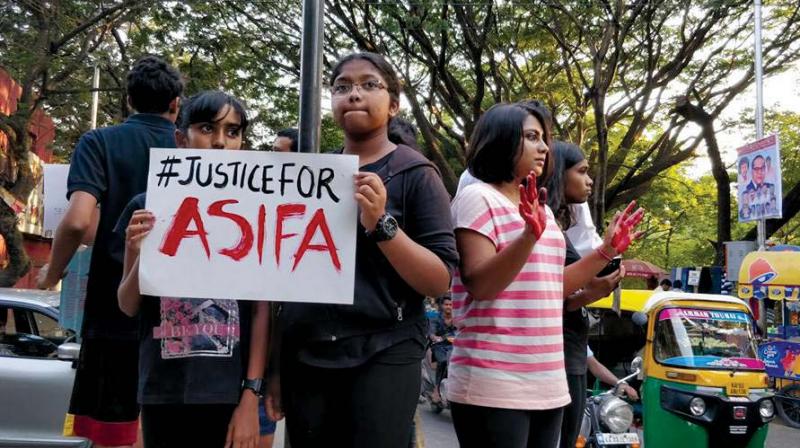ProTest' for change?

As the recent shocking rape incidents have shaken the country, everyone has come together to save the innocence of the girl child. In a selfless act, many people in the city and other cities are protesting against the Kathua and Unnao rape cases. But, how do these protests make a difference? Bengaluru, too, stood in solidarity in different neighbourhoods, and about 30 protests were held all over the city. The idea was to brandish that this is #MyStreet and #MyProtest, which was different from the regular protests you see outside town halls. We asked activists, social workers and protest organisers from the city whether these protests really serve their purpose?
Lakshmi Karunakaran, an educator and a social worker believes that protests are a way to voice your distress and that nowadays, we all feel the fatigue of these protests in terms of what it is doing to change things around. “But, that does not mean that we can keep quiet when incidents like these take place, we could conduct these protests differently but keeping our concerns and rage to ourselves can never result in any good. There are different kinds of protests that took place in the country, and everyone had their own way of saying ‘it’s enough’. One artist from Goa, who had been drawing pictures of Asifa had his own way of showing solidarity among the people, which I believe is a great thought.”
Amandeep Sandhu, an author and an organiser, who conducted these protests along with Arundhati Ghosh says, “The record of the protests succeeding is very low when lawyers and people in authority aren’t the ones supporting it. This time, these protests were very different unlike the Nirbhaya’s case when the whole country got together. This time the country was divided into two kinds of people where lawyers and policemen are preventing the case being filed. Coming, back to the purpose of these protests — it is to change the system but since that is very difficult to attain at times, the other purpose that such protests serve is to give a message to the authorities who want us to be a certain way that these people stand firm in solidarity, holding their ground. Bringing all people together, of all ages, from the little ones to the older generations, everyone could take part in these protests as it was in their neighbourhoods.”
While, Girish Balachandran, a sociologist thinks, “In an era where media is increasingly under political pressure to ‘tow the line’, protests help draw attention to issues and mobilise people on the fringes with shared purpose. Protests formed a major part of how we secured our Independence but they don’t work on their own. They’re effective when they form part of a larger movement with a clear goal communicated, consistently. Protests also require a leader. People listen when there is a human face articulating the mood of the community that is able to engage in sustained dialogue and negotiate a result. The key is to get enough people to care and then channelise the energy and the outrage into unstoppable change in attitudes and behaviour.”
Activist, Ashley Tellis feels, “Protests do make a difference, especially real ones out on the roads. Online protests are empty and useless and usually unthinking. There was a big brouhaha about Raya Sarkar’s list. Hundreds of women on the Internet supported it. Where are these women at Pinjra Tod protests on the ground in DU over the recent sexual harassment cases? It is easy to outrage on the Internet, it is sick and empty. However, protests on the ground are necessary and do make a difference. In a democracy, as Gunter Grass puts it, ‘the citizen’s job is to keep his mouth open. If he does not, totalitarian regimes take over.’”

